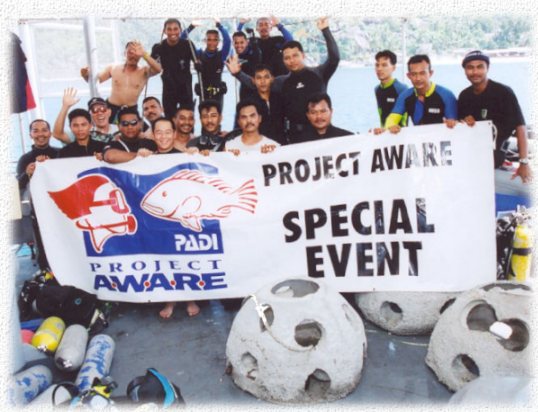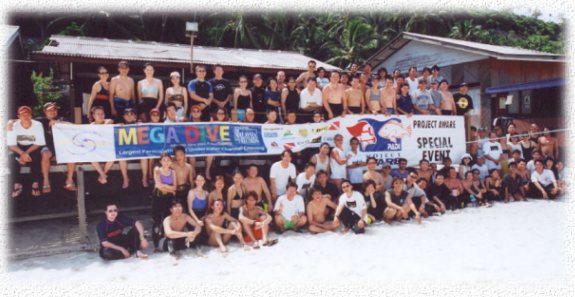|
Footprints in the
Sand |
|
Whale Shark wins International
Protection - Nations vote to protect world's largest
fish. |
|
November 15, 2002:
Parties to the Convention on
International Trade in Endangered Species (CITES)
extended the first-ever international protection to a shark species
by voting today to protect the whale shark
under Appendix II. The listing, which was
proposed by the Philippines and India,
gives critical support to whale shark conservation
by regulating trade in whale shark parts. Whale sharks
are primarily threatened by over fishing to
supply international trade. "CITES protection is a major step forward for whale shark conservation," said Elizabeth Murdock, Manager of WildAid's Shark Conservation Program. "International protection is critical to the conservation of this rare and highly migratory species. CITES can now do its much-needed part by regulating international trade and ensuring that trade does not threaten the whale shark's |
|
" ...... and the sea grants
new dreams of hope." - Christopher Columbus "hope alone is often not enough! Occasionally it needs a helping hand and a voice!" - Strike |
|
While demand has
been increasing in Taiwan, reported whale
shark catches there have declined by 60-70% in the past
few years, leading to unsustainable whale shark
fishing in other areas and transforming
small, subsistence-level fisheries into large-scale
efforts supplying international trade. In the Philippines and
India, catches fell dramatically due to over fishing before whale
sharks were protected in these countries. But recent confiscations
of illegal shipments of the meat, bound for Taiwan and Hong Kong,
indicate that poaching remains a threat to this gentle giant. The resolution to include whale sharks under Appendix II passed with 81 votes, achieving the necessary two-thirds majority by two votes. The basking shark, the second largest living fish, was also approved for Appendix II today, with 82 supporting votes. |
|
"This listing is
a tremendous victory," said Victor Wu,
Shark Campaigner for WildAid. "The Parties sent a clear
message to the world today that whale sharks are far more valuable
alive than dead-and that their future depends upon
our actions today." Whale shark tourism brings millions of dollars annually to areas such as Thailand (US$3 million; Phuket only), Belize (US$1.45 million) and Australia (US$6.99 million), all of which have protected the fish in local waters. These annual revenues generate far more than a one-time catch of the scarce fish. WildAid is a leading non-profit organization dedicated to eliminating illegal trade in threatened wildlife and protecting wildlife habitat through effective and sustainable solutions on a local and global scale. Headquartered in San Francisco, WildAid has offices in Washington D.C., London, Vladivostok, Bangkok, Phnom Penh and the Galapagos Islands. For further information on WildAid contact: In Santiago: Elizabeth Murdock. E-mail: murdoch@wildaid.org or, Victor Wu, Shark Campaigner, e-mail: wu@wildaid.org In San Francisco (USA): Peter Knights, Executive Director, e-mail: knights@wildaid.org |
|
Australia |
|
Sunday, December 1st:
Thousands gathered in Fremantle to
spearhead a Statewide campaign aimed at
stopping the Mauds Landing development at
Ningaloo Reef. Opposed to development on the scale proposed for the Mauds Landing site, speakers - including author, Tim Winton and basketball star, Luc Longley - warned the Western Australia Premier of the potential electoral backlash should the development proceed. The latest proposal from developer, Coral Coast - approved conditionally by the Environmental Protection Authority in November - includes 250 residential lots, about 1,000 private rooms, camping and caravan sites and an inland marina. |
|
Status of Coral Reefs of the
World: 2002
A comprehensive document compiled by the Australian Institute of Marine Science, the, 'Status of Coral Reefs of the World: 2002', edited by Clive Wikinson, offers both good and bad news and provides a meaty insight into what is being done - and what needs to be done - in order to conserve and protect these natural assets. For the detailed report, see the A.I.M.S. website at: http://www.aims.gov.au/pages/research/coral-bleaching/scr2002/scr-00.html |
|
The whale shark is the
largest fish on Earth, reaching up to 20 meters in length and
weighing up to 34 tons. It feeds by
filtering plankton and other small organisms
through its gills, making it one of only three known
species of large, filter-feeding sharks. Whale sharks
are long-lived (60 to 100 years), slow to mature
(at 30 years) and reproduce. Whale shark meat has recently emerged as a delicacy in Taiwan the world's largest market for the meat. Annual sales more than doubled in just two years from 1998 to 2000, while demand for shark fin soup in Asia has also increased pressure on whale sharks: Their huge fins, which retail for thousands of dollars each, are sold for soup and displayed in restaurants in Singapore, China and Taiwan. |
|
Peter Tagliaferri,
Mayor of Fremantle, welcomed the crowd
and later said. "It was the biggest rally in living memory in
Fremantle." Speakers delivered the message that the community would not accept the marina resort and would take the issue to the next election if necessary. Sustainable, low-impact development was advocated as an achievable and responsible alternative. Tim Winton said, "The Premier will be in no doubt about the public mood on this issue. It was an awesome display of public feeling. For every person at the rally, we know that dozens more feel the same." Simultaneously, people gathered at the remote Ningaloo towns of Coral Bay and Exmouth. Quiet at this time of the year, the whole town of Coral Bay gathered at the proposed site at Mauds Landing and was greeted by the sight of giant manta rays where the seawalls would be built. Over two hundred people also rallied in Exmouth. |
|
Campaign spokesperson, Paul
Gamblin, said, "Action in these towns today shows the
overwhelming support in the region for sensitive development
which will not harm the environment. After all, that is
what underpins the tourism industry." For further information on the campaign to save Ningaloo Reef, visit their website at: http://www.save-ningaloo.org |
|
Indonesia
Nursery of artificial reefs in
Pemuteran, Northwest Bali, Indonesia
Due to mounting local concerns about reef deterioration, Yos W.K. Amerta, President of Gahawisri Bali (The Bali Branch of the Indonesian Association of Watersports) and owner of Yos Diving Centre and Marine Sports, and a PADI International Resort & Retailer Associations member) invited Wolf Hilbertz and Tom Goreau from New York to start restoration projects in Bali. This decision followed a workshop in coral reef restoration held at the Asian Dive Exposition in Bangkok in May 2000. Twenty-two Biorock coral nursery structures have recently been installed in the Pemuteran Village Marine Protected Area, in Northwest Bali. Currently with a total length of 222 meters situated in an area of 2 hectares, this is the largest Biorock coral reef nursery and restoration project worldwide and exceeds the combined sizes of all other ongoing projects in the Pacific, Caribbean and Indian Ocean. |
|
The project, although
still in its early stages, already has the
majority of local coral species in
cultivation. Their enhanced growth
rate, reproduction and resistance to environmental
stress provides a critical reservoir of healthy corals,
(a Coral Reef Ark) to resist future
hot periods caused by global warming and restore damaged
reefs and vital fishing areas - once destructive human practices can
be halted. Bali's coral reefs have been severely damaged in recent years due to the use of bombs and cyanide by fishermen, excessively high water temperatures linked to global warming, and other stresses. The Pemuteran area is unique because no other part of Bali has such large areas of shallow reef that are accessible to divers and snorkellers. This is because the region lacks the extremely strong currents and waves that characterize other coastal areas of Bali. However, Pemuteran reefs have suffered greatly from damage by destructive fishing because the low currents make it far easier for fishermen to retrieve fish that are killed by bombs or paralyzed by cyanide. Pemuteran village residents have taken action to prevent use of these destructive methods in their reefs, whether by locals or by outsiders. However, the amount of damage was so great that action was urgently needed to restore reef habitat for tourism and fisheries. |

|
Coral nurseries built
using the Electrolytic Mineral Accretion Technology (Biorock) of
Hilbertz and Goreau, provide unique advantages for restoring coral
reefs. Corals grown on mineral accretion are
exceptionally bright colored and rapid growing,
support dense fish populations and
are more resistant to all environmental
stresses except bombs and poisons.
The first projects in Indonesia were built in the Pemuteran Marine Protected Area in June 2000 by Hilbertz and Goreau, working with Yos Amerta of Gahawisri. They were located at the front of PADI International Resort & Retailer Associations facilities - Yos Diving Centre, at Pondok Sari and Reef Seen Aquatics. Three more structures were added in October 2000 in front of the Village Sea Temple during an international training workshop on coral nursery construction. The workshop was funded by a grant from the Leslie Jones Foundation to the Global Coral Reef Alliance's coral reef restoration program and donations in kind from Yos Dive Shop and Hotel Pondok Sari. The success of these structures in stimulating rapid coral growth was apparent within months, leading to requests to greatly expand the project. Taman Sari Hotel donated further funds to support the construction of new projects in March 2001. For more information on how
you can help with aquatic protection and conservation, visit www.projectaware.org |
|
Malaysia
Planet Scuba supports
artificial reef project - Another PADI Project AWARE event successfully
completed |
|
PADI divers posing with
the reef balls aboard the navy vessel KD Ketam before
deployment. |

|
Divers from Planet
Scuba's 'Mega Dive - The 2nd Wave' |
|
Under the banner of PADI's
Project AWARE, Planet Scuba, a PADI 5-Star Instructor Development
Centre, in Kuala Lumpur, together with ReefBall
Asia, Marine Park Department and the Malaysian
Armed Forces, have successfully deployed 4 reef balls in Pulau
Dayang, off the coast of Johor in Malaysia. The reef balls, each weighing about 250 kg, are state-of-the-art reef modules designed by ReefBall Asia to provide the same function as a natural coral. Named 'Planet Reef', the reef is the first privately sponsored artificial reef of its kind in Malaysia and is Planet Scuba's special dedication to all present and future lovers of the ocean. |
|
A PADI International
Resort and Retail Associations Member, training PADI
scuba divers from beginner to Instructor levels, Planet
Scuba share The Project AWARE Foundation's worldwide efforts to
preserve the underwater environment.
Says P.K. Chee, Director of Planet Scuba Sdn Bhd, "Project AWARE encompasses our environmental awareness and protection philosophy. Through our training, PADI divers will learn the importance of protecting fragile aquatic ecosystems and are encouraged to become actively involved in their preservation efforts." For more information on how you can be involved with their next special event, please contact Planet Scuba Sdn Bhd at sales@planetscuba.com.my: For details on how you can
help with aquatic protection and conservation, visit www.projectaware.org |